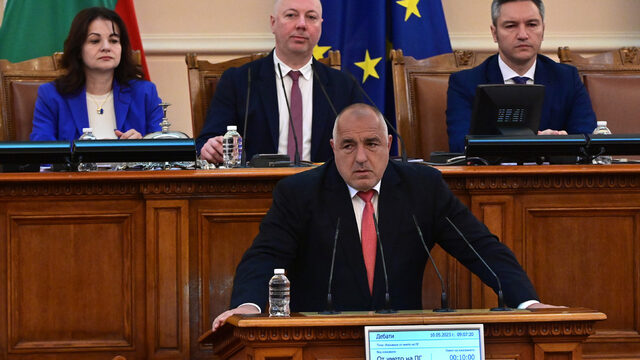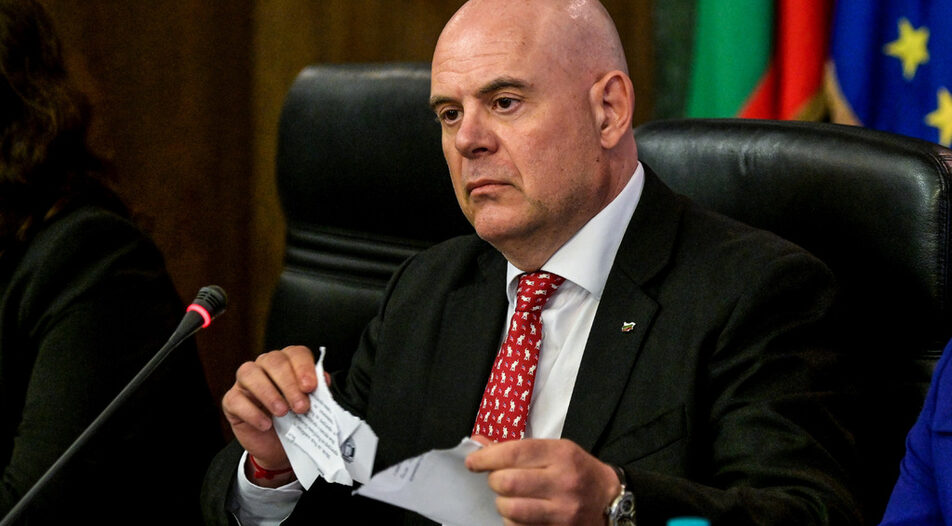It might be hard to believe, but the political chaos in Bulgaria became even messier yesterday, after Prosecutor General Ivan Geshev entered a Mexican standoff with his former protege and current deputy Borislav Sarafov, as well as with GERB leader Boyko Borissov.
At a staged press conference on Monday (no journalists' questions allowed), a disgruntled Mr Geshev pathetically attacked the two - alongside the "political trash in Parliament" and the "traitors" in his institution - and refused to file his resignation, theatrically concluding that he would finish his mandate and his work "in the name of the Bulgarian people and the motherland."
Mr Geshev's words served as the first act of a vaudeville that lasted the entire day: Boyko Borissov rebutted by saying he does not interfere in the prosecution and then Borislav Sarafov struck back at his superior and asked for bodyguards from the Justice Ministry, saying that he fears for his life and he "knows what people like [Geshev] are capable of."
The rift followed a surprising call for Mr Geshev's resignation by PM-nominee Mariya Gabriel last week and could have repercussions far beyond the fate of the head prosecutor. Most importantly, Monday's exchanges offered a glimpse into the ugly underbelly of Bulgarian politics and their intersection with the judiciary.
What exactly happened on Monday?
The first act began on Monday morning with Prosecutor General Ivan Geshev demonstratively tearing in pieces his resignation letter in front of the TV cameras. Mr Geshev, a self-declared victim of the political mafia and the oligarchy, reported that he had received anonymous threats against himself and his family, and that he had also refused an offer - at the indirect behest of Boyko Borissov - to be sent as an ambassador to Turkey or Israel.
He also assailed MRF - the other major party he had relied on for political backing throughout the years, which turned on him last week and joined GERB in their call for resignation - for their "betrayal". And in passing he mentioned that the flagship of the attack against him in recent days - Borislav Sarafov, who is his second-in-command and also the head of the National Investigation Service, had tried to bury the emblematic BarcelonaGate investigation that linked Boyko Borissov's name to a money laundering scheme in Spain.
Mr Geshev spoke at length - but extremely vaguely - about various acts of perfidy perpetrated against him by his opponents. For example, he spoke openly about his links to various GERB politicians who had warned him of his likely fate; he directly blamed Mr Borissov for threatening him via prosecutors loyal to GERB - but also discussed at length how he'd been keeping prosecutors in check.

Sarafov strikes back
Hours after the prosecutor general's press conference, his ex-protege and newfound nemesis Borislav Sarafov struck back in a press conference of his own. He is also at the heart of the scandal related to the investigation into the alleged assassination of the prosecutor general. At first he had categorized it as an act against the state and supported his boss's version, but days later he turned against Mr Geshev and announced that under his leadership the state prosecution had entered the realm of politics. And after his words last week, the six prosecutors in the SJC demanded Geshev's resignation.
On Monday, after Mr Geshev's press conference, Mr Sarafov explained that he knew "his methods well" and that is why he asked for state protection for himself and his family. Mr Sarafov's main argument against his superior was that, under his leadership, the prosecutor's office had been keeping investigations against politicians purposefully in a loop so that they could be used to blackmail them. Sarafov cited BarcelonaGate - the investigation that could implicate Mr Borissov in a money laundering scheme.
That was not all. Mr Sarafov said that Mr Geshev has been living in a residence owned by the state near the Borovets resort (hence the location of the bombing attack against him). "None of the magistrates has access to it because Geshev simply privatized it for his own use and uses the employees as his personal servants. Geshev uses two armored vehicles, which were also bought with the institution's money. The value of each of them is over BGN 1 million," Mr Sarafov said.
A civil war? More like a gangster one
The latest episode of the politico-prosecutorial drama signals an implosion in the Bulgarian status quo. How far it will go - and its exact consequences - are extremely hard to predict. The theatre might simply conclude with Mr Geshev's removal and replacement with Mr Sarafov - another lapdog of the same circles that supported Mr Geshev until recently. Or it might spiral out of control if Mr Geshev really starts pursuing some political goals of his own if he does not accept being sidelined. It is not impossible that he goes beyond threats and launches a full-out onslaught against Mr Borissov - he menacingly (but also very vaguely) stated that the BarcelonaGate investigation is still ongoing.
But whatever the immediate implications of the Monday debacle, one thing is clear - Bulgarian prosecutors are living in what should be a bygone era. One characterized by bomb threats, assassination attempts, clan loyalties and fears that one might be killed by their superior. This sends an ominous message to the Bulgarian public and to outside observers - that Bulgaria has not yet moved on from its dark post-totalitarian past.
The Gabriel cabinet hangs by a thread
The big irony of the whole Geshev resignation debacle is that the proposed cabinet of EU Commissioner Mariya Gabriel that proposed the Prosecutor General's removal might not even pass. Until yesterday, Ms Gabriel could rely on two potential lifelines for support - the WCC-DB reformist line (which she tried to appease by offering Geshev's head) and the "wide support coalition" of BSP, TISP and MRF. Yet, on Monday afternoon Socialist leader Kornelia Ninova announced that her party wouldn't back the Gabriel cabinet because of the uncertainty of GERB's proposed policies. This means that the second option is no longer feasible, as it does not get enough votes to pass the 121 votes barrier. The ball thus remains in the court of WCC-DB, which announced they will consult their party organs on Tuesday evening before making their final decision on supporting the Gabriel cabinet, but so far voices seem to rather oppose coalition.It might be hard to believe, but the political chaos in Bulgaria became even messier yesterday, after Prosecutor General Ivan Geshev entered a Mexican standoff with his former protege and current deputy Borislav Sarafov, as well as with GERB leader Boyko Borissov.
At a staged press conference on Monday (no journalists' questions allowed), a disgruntled Mr Geshev pathetically attacked the two - alongside the "political trash in Parliament" and the "traitors" in his institution - and refused to file his resignation, theatrically concluding that he would finish his mandate and his work "in the name of the Bulgarian people and the motherland."












